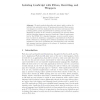Free Online Productivity Tools
i2Speak
i2Symbol
i2OCR
iTex2Img
iWeb2Print
iWeb2Shot
i2Type
iPdf2Split
iPdf2Merge
i2Bopomofo
i2Arabic
i2Style
i2Image
i2PDF
iLatex2Rtf
Sci2ools
127
click to vote
ESORICS
2009
Springer
2009
Springer
Isolating JavaScript with Filters, Rewriting, and Wrappers
Abstract. We study methods that allow web sites to safely combine JavaScript from untrusted sources. If implemented properly, filters can prevent dangerous code from loading into the execution environment, while rewriting allows greater expressiveness by inserting run-time checks. Wrapping properties of the execution environment can prevent misuse without requiring changes to imported JavaScript. Using a formal semantics for the ECMA 262-3 standard language, we prove security properties of a subset of JavaScript, comparable in expressiveness to Facebook FBJS, obtained by combining three isolation mechanisms. The isolation guarantees of the three mechanisms are interdependent, with rewriting and wrapper functions relying on the absence of JavaScript constructs eliminated by language filters.
Allows Greater Expressiveness | ESORICS 2009 | Execution Environment | JavaScript Constructs | Security Privacy |
| Added | 23 Nov 2009 |
| Updated | 23 Nov 2009 |
| Type | Conference |
| Year | 2009 |
| Where | ESORICS |
| Authors | Sergio Maffeis, John C. Mitchell, Ankur Taly |
Comments (0)

